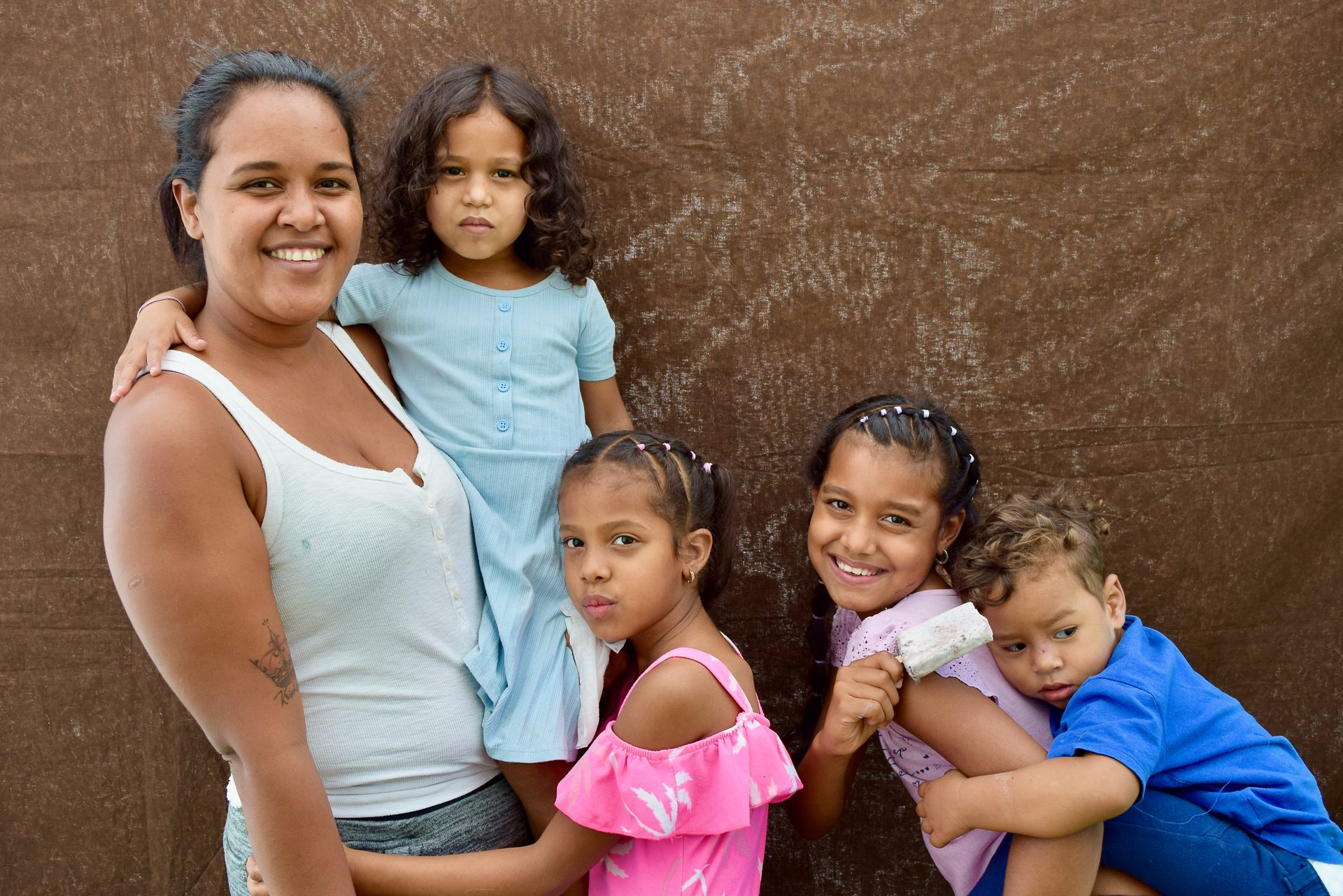 William Estrada para Borderless Magazine
William Estrada para Borderless MagazineEn un refugio temporal del barrio Little Village de Chicago, seis familias inmigrantes comparten sus recuerdos de casa, sus esperanzas para el futuro y cómo es vivir hacinadas con 200 personas.
Vannesa Carolina Godoy, su marido y sus tres hijos se acuestan en el suelo de una cancha de baloncesto para pasar la noche, rodeados de sus pocas pertenencias en un espacio de 2 por 3 metros. Esta noche marca para Godoy el final de una larga travesía por siete países que comenzó en Zulia, Venezuela.
Comparten esta cancha con unos 200 inmigrantes más, 93 de los cuales son niños, procedentes de lugares como Venezuela, Colombia y Perú. Este es el caso de las numerosas familias que actualmente viven en el Piotrowski Park Fieldhouse, en el barrio de Little Village de Chicago.
Muchos de ellos llegaron sin nada, ya que perdieron objetos personales como documentos legales, joyas, ropa y fotografías familiares durante su viaje de meses a Chicago (Illinois). Los que tienen la suerte de encontrar trabajo pueden permitirse reponer lo que perdieron, pero la mayoría ha dependido en gran medida de las donaciones de la comunidad de la Aldea Pequeña.
"Los primeros días fue difícil dormir en el suelo con los niños, pero allí nos proporcionaron unos colchones hinchables que nos regaló la gente que venía de la calle y nos donaron ropa", explica Godoy.
Noticias que ponen el poder en el punto de mira y a las comunidades en el centro.
Suscríbase a nuestro boletín gratuito y reciba actualizaciones dos veces por semana.
Como parte del esfuerzo continuo de la comunidad para comprometerse con los que viven en Piotrowski Park, Borderless Magazine se asoció con el artista William Estrada y los organizadores de la comunidad Laura García Ramírez y Elvia Rodríguez para organizar un evento pop-up que incluyó diversas actividades artísticas y artesanales, música, comida y retratos de familia. Más de 50 retratos de familia fueron creados e impresos por Estrada el 9 de julio de 2023.
A pesar de las condiciones en que viven, las familias hacen lo que pueden para sentirse como en casa en el Parque Piotrowski.
"Los que viven aquí ya son como una familia para nosotros; nos entendemos, nos comunicamos", dijo Verónica Morillo, de 24 años, que lleva dos meses viviendo en la casa de campo. "Siento que cuando nos vayamos de aquí también los vamos a echar de menos".
Borderless Magazine se reunió con seis inmigrantes venezolanos alojados en el Parque Piotrowski para conocer su opinión sobre lo que significa para ellos su hogar.
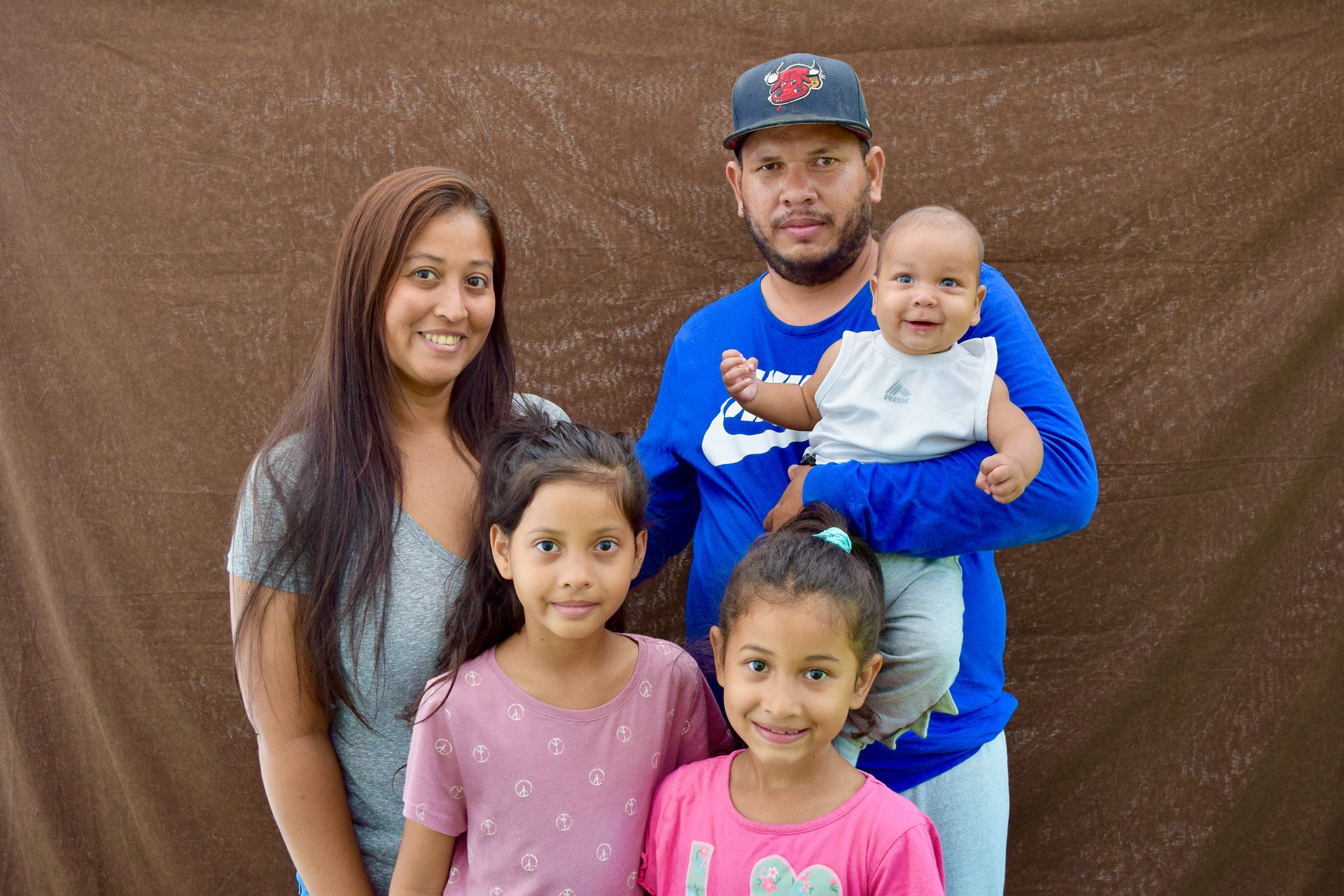
Vanessa Carolina Godoy, 37 años, originario de Venezuela
Godoy abandonó Venezuela debido a la crisis económica. "Me tuve que ir del país sin quererlo. Pero tuve que irme por la situación que había". Tras un largo viaje por siete países, llegó a Chicago con su marido y sus tres hijos en mayo de 2023.
En Venezuela, cuando estábamos en casa limpiando o si salíamos de fiesta, escuchábamos salsa o merengue. Pero mi artista favorito es Daddy Yankee.
Cuando llegamos aquí, dormíamos en el suelo. Toda mi familia duerme junta en el piso de arriba, compartiendo el espacio con otras 12 familias. Todos los que viven aquí, las 200 personas, comparten también el baño de abajo.
En el futuro, me gustaría tener una casa grande, con piscina, si es posible. Me gustaría que toda la decoración fuera blanca. Quiero que mis hijos tengan cada uno su propia habitación, o los chicos en una habitación y las chicas en otra. Quiero que mis hijos tengan televisión y bicicletas, todo lo que no tenían en Venezuela.
Creo que educarse es lo más importante, una prioridad. Estudiar lo es todo. Quiero que mis hijos aprendan inglés.

Carolayns González, 29, y Crystal González, 9 años, originaria de Venezuela
Carolayns nació y creció en Venezuela, pero pasó los últimos cuatro años viviendo en Perú. Dejó Perú en busca de seguridad y libertad para sus tres hijas. En Perú no se sentía cómoda dejando que sus hijas jugaran fuera. "No sabían lo que era un parque o un cine", dice González. "No puedes confiar en nadie cuando viajas como madre soltera con tres hijas", dice. Carolayns y su familia abandonaron Perú después de oír hablar de la violencia selectiva contra las jóvenes cerca de su casa. Tres meses después, llegaron a Chicago en mayo de 2023. Su hermana llegó con su hijo poco después.
Carolayns: Echo mucho de menos mi casa. Era una vida muy humilde porque soy madre soltera. Y es muy duro porque tengo tres niñas. Mi casa en Venezuela era un lugar muy humilde pero confortable. Echo mucho de menos Venezuela. Hace cuatro años que no veo a mi padre allí. Han sido los cuatro años más largos y duros. Este viaje ha sido muy duro.
Valoro mucho lo que tengo en este refugio.
Tengo un colchón y una cama más pequeña. Ponemos nuestras pertenencias a lo largo de las camas. Es un espacio muy pequeño y no tenemos intimidad. No te vas a dormir cómodamente. No es algo agradable.
Crystal: En Perú, el confinamiento era total. No nos dejaban salir porque habían matado a una niña en la esquina. Mi madre tenía miedo, así que no salimos.
Lo que más alegría me da en este momento es mi bicicleta y mis amigos. A veces hacemos TikToks porque estamos aburridos.
Carolayns: En el futuro, no pido una mansión. No pido eso. Sólo pido que esté mi familia, nada más. Que sea algo familiar y que toda mi familia esté junta, incluidos mi madre y mi padre. Eso es todo lo que pido. No estoy acostumbrado a lujos ni nada de eso. No me importa tener una gran televisión o un gran frigorífico. Sólo quiero algo pequeño y cálido que me haga sentir como en casa.
Sólo quiero poder decir que mis hijos prosperaron.
No quiero riquezas. Solo quiero un hogar donde estar segura. Algo para compartir con mi familia. Algo pequeño con una nevera pequeña y una cocina pequeña. No un apartamento súper grande. Una casita. Todo lo que quiero es estar con mi familia, con toda mi familia.
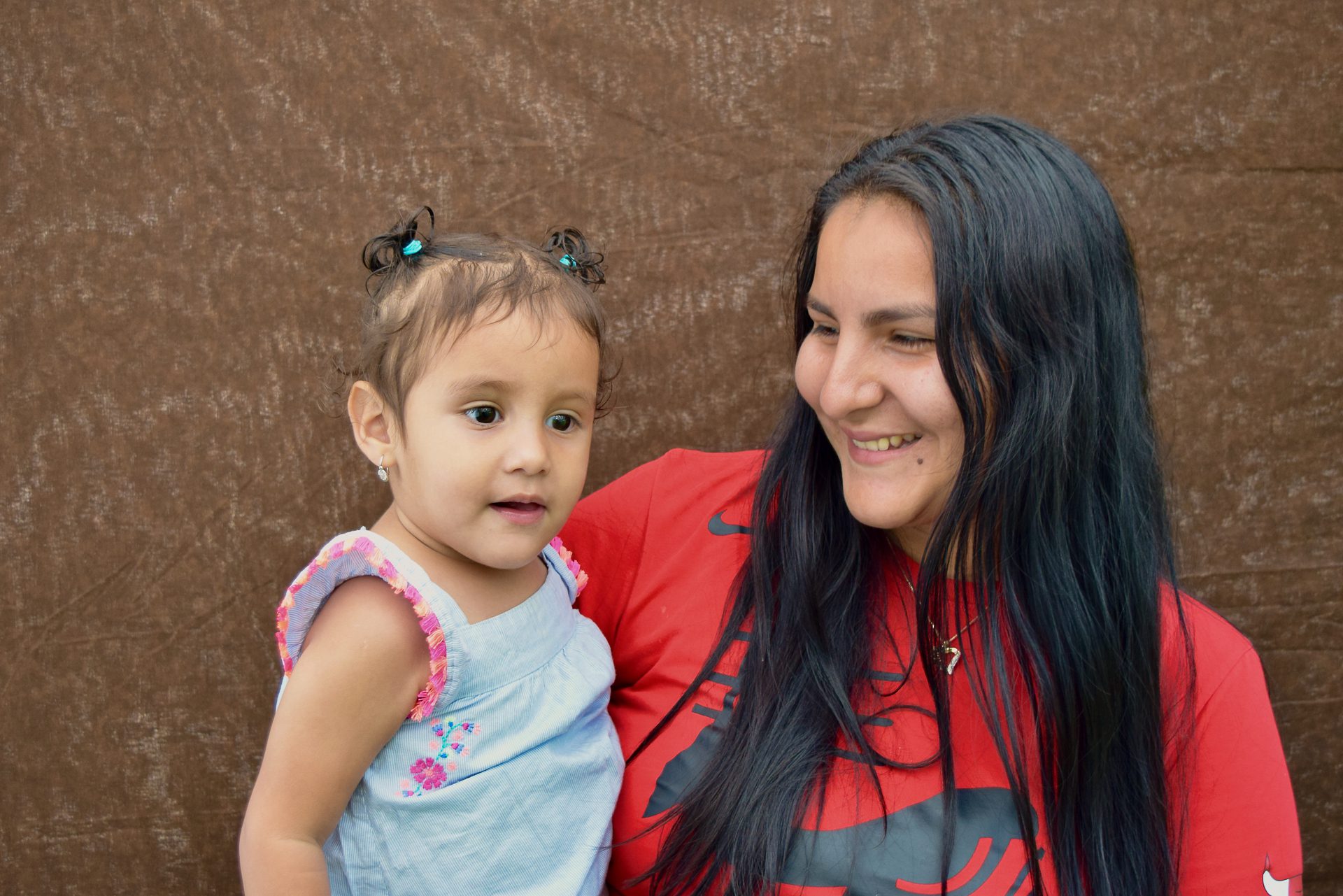
Marlyn Aguirre, 25 años, originaria de Venezuela
Antes de venir a Chicago, Aguirre vivió en Ecuador los últimos cuatro años con su marido y su hija. Se fueron juntos a Estados Unidos, pero su marido fue deportado antes de que llegaran a la frontera entre Estados Unidos y México. Aguirre y su hija viven en la casa de campo desde principios de mayo de 2023.
Ahora mismo se hace lo que se puede. No nos falta de nada, pero no estamos muy cómodos.
Lo que más alegría me da es que tengo a mi hija conmigo.
En el futuro, me gustaría vivir con mi familia. Mis tres hijos, mi marido, que vendrá en el futuro, y mi madre. Quiero trabajar, limpiar nuestra casa, escuchar a Ricardo Arjona. A mi madre también le encanta Ricardo Arjona.
En cuanto a la decoración, me encantan los girasoles. Si pudiera tener una casa pintada de amarillo, con todo amarillo y todo relacionado con girasoles, lo haría. Siento que transmite algo agradable y tranquilo.
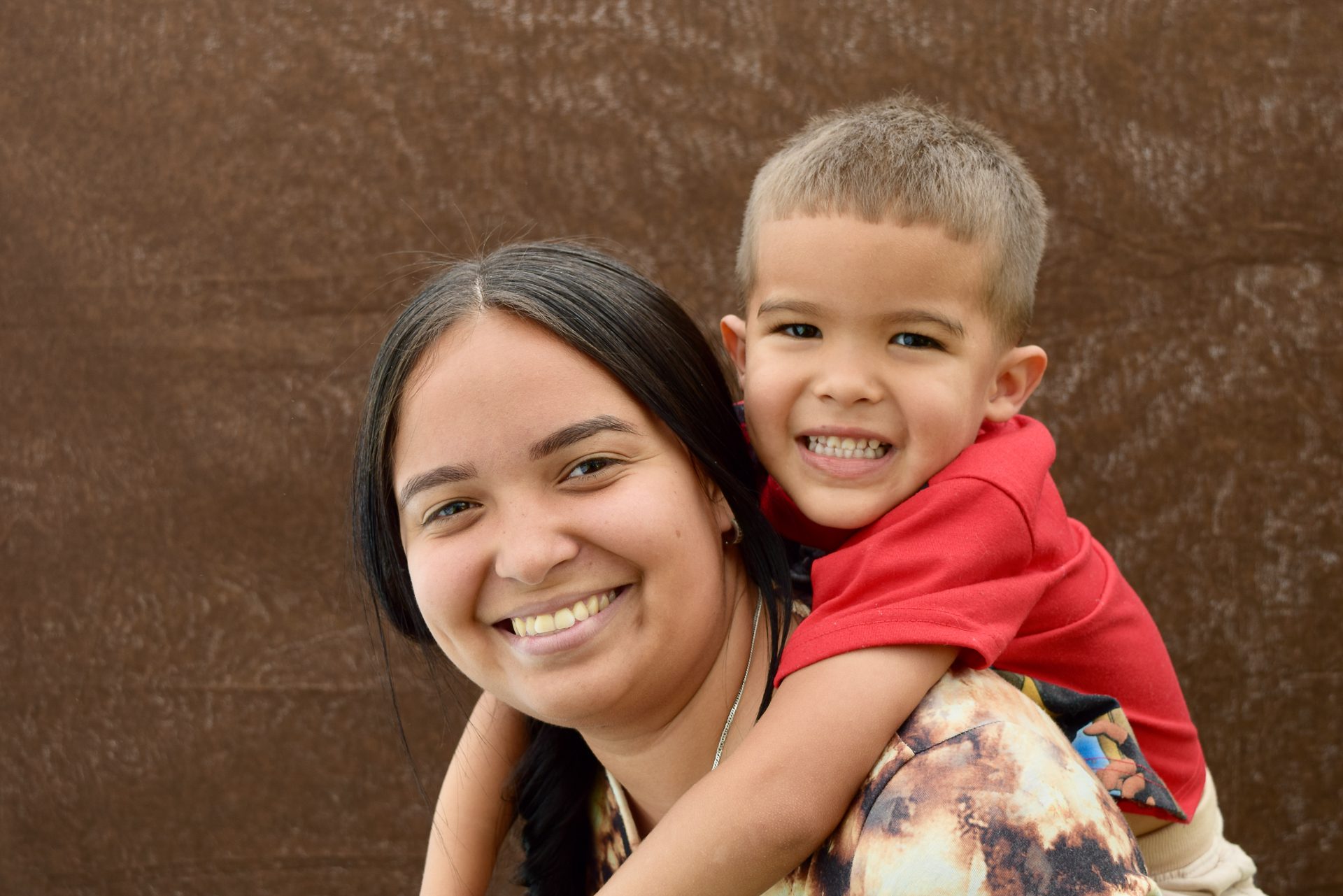
Verónica Morillo, 25 años, originaria de Venezuela
Morillo y su hijo Rafael, de 4 años, son de Santa Rosa (Venezuela). Salieron de Venezuela para reunirse con su pareja, que llegó a Chicago hace meses en busca de trabajo. Espera poder traer a toda su familia a Estados Unidos.
En Santa Rosa somos una gran familia, unas 100 personas. Asamos e hicimos hamburguesas para compartir con la familia. Pero mi comida favorita es el pescado frito con plátanos verdes fritos, ensalada y raya.
Durante todo este viaje, he llevado esta cadena que tengo aquí. La he tenido durante más de cinco años. Nunca la he dejado. Es de Jesucristo. Me la regaló mi mamá y por eso nunca me la quito. Siempre la llevo porque siento que es como una bendición.
De momento, nos sentimos bien en el refugio. El trato al principio fue un poco duro porque no estamos acostumbrados a las leyes ni a seguir algunas normas. Al principio fue un poco duro, pero ahora los que viven aquí son como nuestra familia. Nos entendemos y nos comunicamos.
En el futuro, espero tener una casa parecida a la de Venezuela y poder compartirla con mi familia. Ya me imagino en mi casa con muebles elegantes, una bonita cocina, escuchando reggaeton y viviendo con mi hijo, mi pareja, mi madre y mis hermanos y sobrinos.
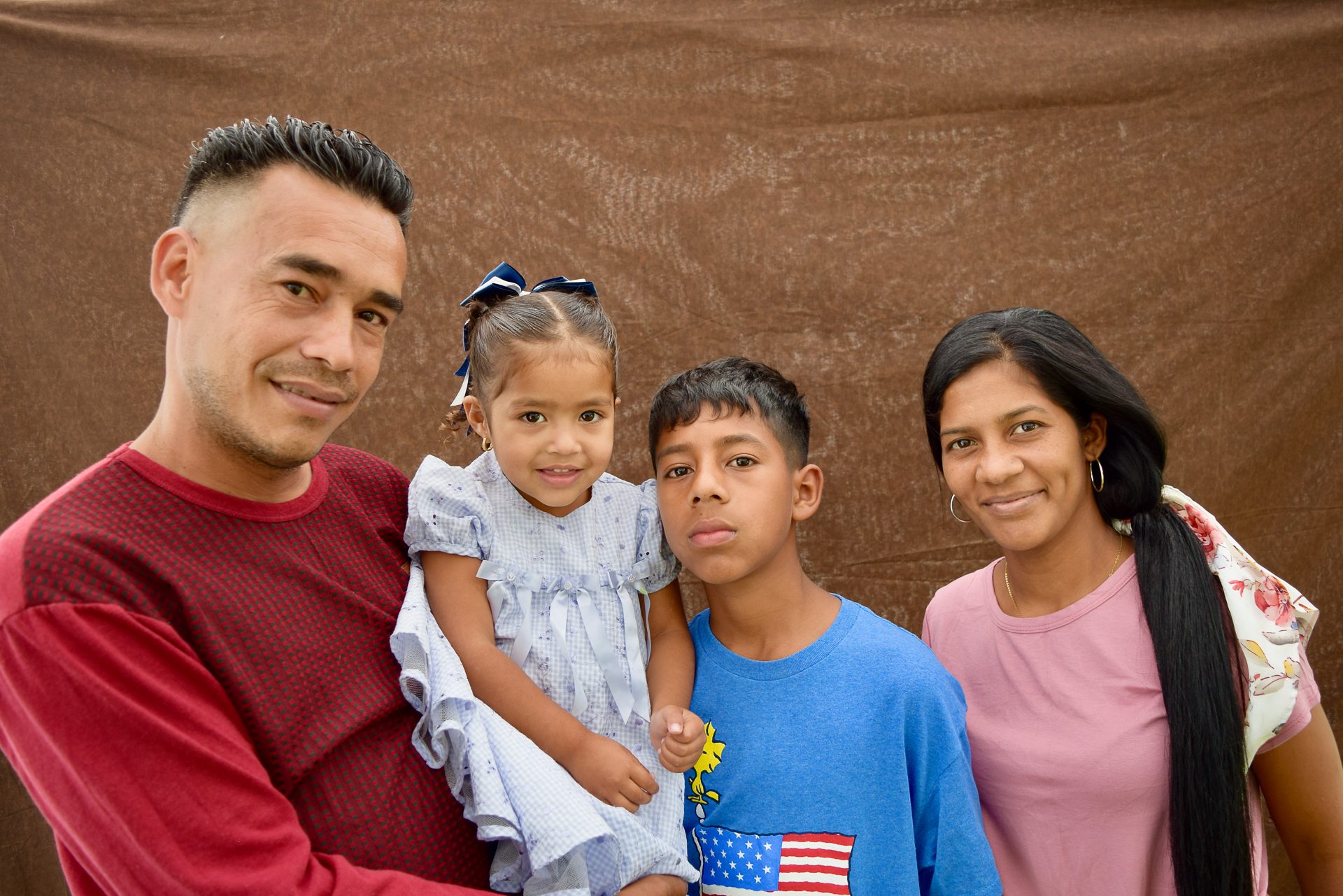
Yolanda Méndez, 32 años, originaria de Venezuela
Méndez pasó un año en Chile con su familia antes de venir a Estados Unidos. Hizo el viaje con su hijo, su hija y su marido desde Anzoátegui, Venezuela. Méndez y su marido han encontrado trabajo en una lavandería. Su trayecto es de unos 30 minutos en bicicleta y trabajan de 8 de la tarde a 4 de la madrugada.
En Venezuela, mi casa era una casa normal y bonita. Una casa espaciosa con un patio en la parte delantera de la casa. Era muy bonita.
La situación de vida actual es difícil porque hay mucha gente en el espacio. Estamos un poco apretados.
Intentamos llevar a los niños al parque a diario. Los domingos vamos a la iglesia y los niños también se distraen. Esperamos en Dios que pronto salga algo de esto.
El futuro es la esperanza que tenemos ahora. No pido mucho. Esperamos una casita normal. Seríamos felices en cualquier sitio. Espero que sea igual que mi casa en Venezuela. Queremos vivir en paz. Nos gustaría conseguir buenos trabajos y que a nuestros hijos les fuera bien en la escuela. También esperamos aprender inglés.

